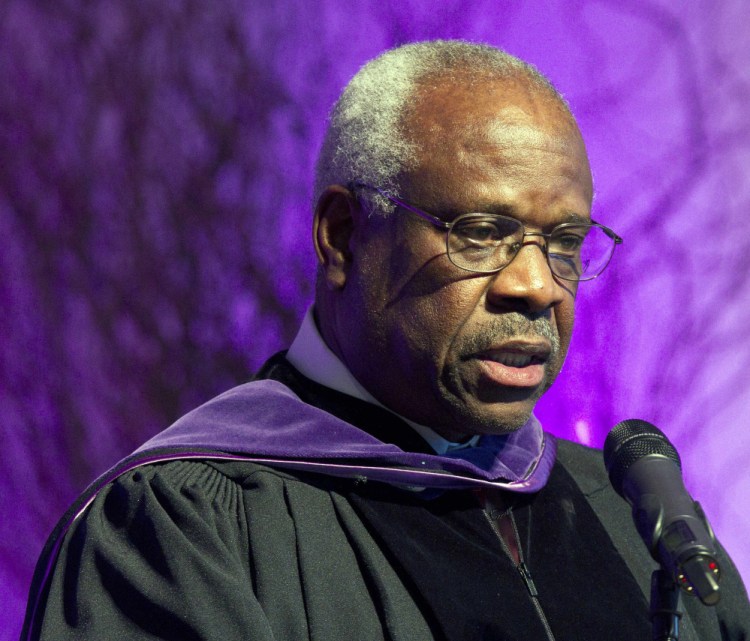WASHINGTON — U.S. Supreme Court Justice Clarence Thomas broke a decade-long silence in court Monday to ask several questions during oral arguments in a gun rights case brought by two Maine men.
Thomas stunned lawyers, reporters and others at the Supreme Court when he questioned the legal basis for suspending the constitutional rights of the men, who are banned by federal law from owning guns because they have past convictions for domestic violence.
“I was amazed,” said the men’s lawyer, Virginia Villa, a former federal public defender in Bangor.
None of the other justices visibly reacted to Thomas’ remarks.
Thomas last asked a question in court on Feb. 22, 2006. His unusual silence over the years has become a curiosity and also has drawn criticism from some who say he is neglecting his duties as a justice. He has previously said he relies on the written briefs and doesn’t need to ask questions of the lawyers appearing in court.
The 10-year anniversary of his courtroom silence came just days after the death of Justice Antonin Scalia, Thomas’ friend and fellow conservative.
For years, Thomas sat directly to Scalia’s right. Scalia died Feb. 13 and his chair is now draped in black in a tribute to his nearly 30 years on the court.. Thomas was one of only two people invited by Scalia’s family to recite a prayer during the funeral Mass on Feb. 20.
Thomas’ questions Monday came in a case in which the court is considering placing new limits on the reach of a federal law that bans people convicted of domestic violence from owning guns.
Few reporters showed up Monday for arguments in the case, in which the justices considered appeals from the two men who say their guilty pleas for hitting their partners should not disqualify them from gun ownership. The men say the law should only cover intentional acts of abuse and not those committed in the heat of a dispute.
During the first 45 minutes of oral arguments, most of the justices appeared to favor the government’s position that even reckless acts of domestic assault fall under the law. Thomas did not pose questions to Villa, who has continued pursuing the appeal despite retiring and moving to Wisconsin.
In preparing for the case, Villa said, people joked about the possibility that Thomas could break his silence in her first Supreme Court appearance.
“It’s always something to tease about because he never does (ask questions),” she said in a phone interview Monday with the Portland Press Herald.
With about 10 minutes left in the hour-long session, Justice Department lawyer Ilana Eisenstein was about to sit down after answering a barrage of questions from other justices when Thomas caught her by surprise.
“Ms. Eisenstein, one question,” Thomas said. “This is a misdemeanor violation. It suspends a constitutional right. Can you give me another area where a misdemeanor violation suspends a constitutional right?”
Eisenstein noted that violating other laws can, in some cases, limit a person’s free-speech rights under the First Amendment.
Thomas peppered Eisenstein with several questions about Second Amendment gun rights, a topic no other justice had covered. He noted that the law allows someone convicted of a misdemeanor assault charge to receive a lifetime ban on possessing a gun, “which at least as of now results in suspension of a constitutional right.”
“The suspension is not directly related to the use of a weapon?” Thomas asked.
Eisenstein said he was correct, but noted that Congress passed the law to prevent people accused of domestic violence from later using weapons against a family member. Thomas then asked how long the suspension of the right to own a firearm lasts.
Eisenstein said it was indefinite.
“It was highly gratifying since he was asking questions that I raised in my brief that the government had not answered,” Villa said.
In one of the cases, Stephen Voisine of Corinth pleaded guilty in 2003 to simple assault after slapping his girlfriend in the face while he was intoxicated. In 2009, he was arrested on a charge of killing a bald eagle with a rifle. Authorities noted he was banned from owning a gun because of his domestic violence conviction and he was then charged under the federal gun law.
The other case involves William Armstrong III of New Vineyard, who pleaded guilty to simple assault in 2002 after pushing his wife during an argument and leaving a “red mark.” Eight years later, police searching Armstrong’s home discovered six firearms and ammunition.
Armstrong was charged under the same statute as Voisine and their cases were combined on appeal.
“It’s a very great honor to appear before the Supreme Court at any point, but to have Justice Thomas highlight the importance of a core civil rights issue was especially gratifying,” Villa said.
Although she wouldn’t call it the defining moment of her career, she said, “It was definitely a highlight.”
Staff Writer Leslie Bridgers contributed to this report.
Send questions/comments to the editors.



Success. Please wait for the page to reload. If the page does not reload within 5 seconds, please refresh the page.
Enter your email and password to access comments.
Hi, to comment on stories you must . This profile is in addition to your subscription and website login.
Already have a commenting profile? .
Invalid username/password.
Please check your email to confirm and complete your registration.
Only subscribers are eligible to post comments. Please subscribe or login first for digital access. Here’s why.
Use the form below to reset your password. When you've submitted your account email, we will send an email with a reset code.